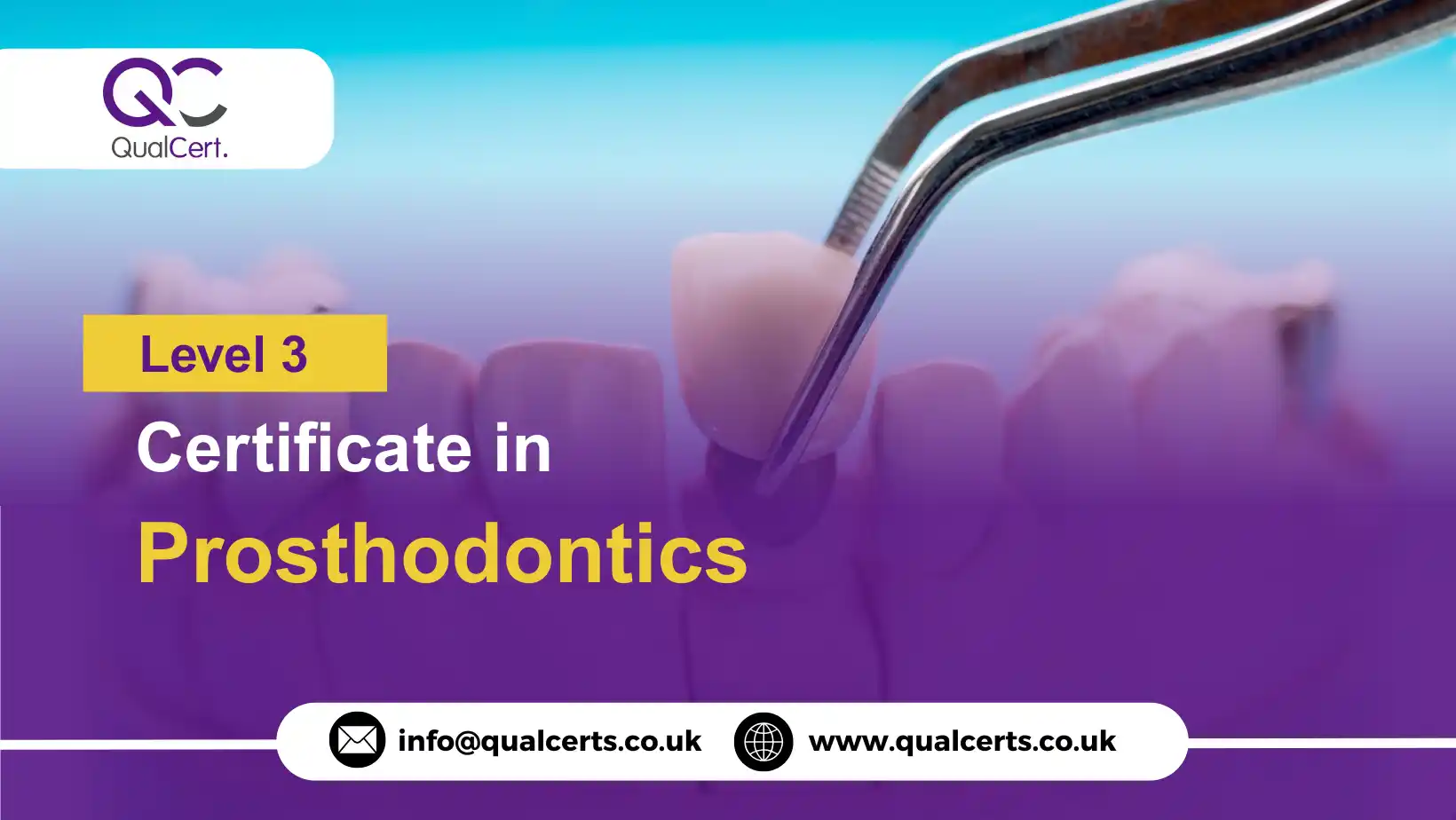The QualCert Level 3 Certificate in Prosthodontics is a specialist qualification designed for dental professionals seeking to advance their expertise and career prospects within the field of prosthodontics. This course is tailored specifically for experienced practitioners rather than those new to the dental profession, offering learners the opportunity to deepen their knowledge and enhance their practical skills in managing prosthodontic cases.
Ideal for dental nurses, assistants, and allied health professionals, this qualification supports ongoing professional development and contributes to Continuing Professional Development (CPD) requirements. By completing this course, learners gain a thorough understanding of prosthodontic principles, techniques, and patient care, enabling them to contribute more effectively within clinical teams and improve patient outcomes.
Centres delivering the QualCert Level 3 Certificate in Prosthodontics uphold rigorous standards to ensure high-quality training. These centres employ competent and qualified staff who are experienced in prosthodontic practice and education. They also provide learners with comprehensive materials, resources, and access to practical training environments essential for achieving success in the qualification.
Course Contents of QualCert Level 3 Certificate in Prosthodontics :
The QualCert Level 3 Certificate in Prosthodontics , offers 20 Credits, requiring a Total Qualification Time (TQT) of 100 hours, including 70 Guided Learning Hours (GLH).
| Unit Ref# | Unit Title | Credit | GLH | TQT |
| QC27004-1 | Anatomy and Physiology Relevant to Prosthodontics | 4 | 14 | 20 |
| QC27004-2 | Principles and Types of Prosthodontic Appliances | 4 | 14 | 20 |
| QC27004-3 | Impression Taking and Material Selection | 4 | 14 | 20 |
| QC27004-4 | Fabrication and Fitting of Removable Prostheses | 4 | 14 | 20 |
| QC27004-5 | Patient Care and Aftercare in Prosthodontics | 4 | 14 | 20 |
Entry Requirements for the QualCert Level 3 Certificate in Prosthodontics :
Minimum Age:
Learners must be at least 18 years old to enrol in this course.
Educational Background:
A basic level of education equivalent to GCSEs (or Level 2 qualifications) in English and Science is recommended to ensure learners can comprehend course materials effectively.
Experience:
This qualification is designed for dental professionals or allied health workers with some prior experience in dental care or clinical environments. It is not suitable for complete beginners.
Language Proficiency:
Learners should have a good command of English, both written and spoken, to engage fully with course content, participate in assessments, and communicate effectively in clinical settings. Proof of English proficiency may be required if English is not the learner’s first language.
Learning Outcomes for the QualCert Level 3 Certificate in Prosthodontics :
Anatomy and Physiology Relevant to Prosthodontics
- Understand the structure and function of the oral cavity and related tissues
- Identify key anatomical features relevant to prosthodontic treatment
- Explain the physiology of the jaw and masticatory muscles
- Recognise common anatomical variations affecting prosthodontic care
Principles and Types of Prosthodontic Appliances
- Describe the different types of prosthodontic appliances and their purposes
- Understand the basic principles behind prosthodontic appliance design
- Identify indications and contraindications for various prosthodontic devices
- Explain how prosthodontic appliances restore oral function and aesthetics
Impression Taking and Material Selection
- Demonstrate knowledge of impression materials used in prosthodontics
- Understand the techniques for accurate impression taking
- Select appropriate materials based on clinical requirements and patient needs
- Recognise common issues and solutions during impression procedures
Fabrication and Fitting of Removable Prostheses
- Explain the steps involved in the fabrication of removable prostheses
- Understand the fitting process and adjustments needed for patient comfort
- Recognise the importance of accuracy and precision in prosthesis fabrication
- Identify common problems with removable prostheses and how to resolve them
Patient Care and Aftercare in Prosthodontics
- Understand the importance of patient education and communication
- Provide effective aftercare instructions for prosthodontic patients
- Recognise potential complications and how to manage them
- Support patients in maintaining oral hygiene and prosthesis maintenance
This Level 3 Certificate in Prosthodontics is ideal for dental and allied health professionals who want to enhance their expertise and career prospects in prosthodontic care. It is designed specifically for individuals with some experience in dental or clinical environments rather than complete beginners. The course is suitable for:
- Dental nurses, assistants, and technicians seeking to specialise or deepen their understanding of prosthodontics.
- Allied health professionals working in dental or clinical settings aiming to improve their practical skills.
- Experienced practitioners focused on improving patient outcomes through advanced prosthodontic knowledge.
- Professionals committed to fulfilling Continuing Professional Development (CPD) requirements while advancing their careers.
- Individuals involved in the fabrication, fitting, and aftercare of prosthodontic appliances who wish to gain formal qualification.
By completing this course, learners will be well-equipped to contribute confidently and competently within prosthodontic clinical teams.
To deliver the Level 3 Certificate in Prosthodontics course effectively, centres must meet several essential requirements to ensure high-quality training and learner success. These include:
- Maintaining accreditation and compliance with QualCert standards to offer Level 3 qualifications in prosthodontics.
- Employing qualified and experienced tutors with relevant expertise in prosthodontics or related dental fields.
- Providing up-to-date learning resources, including textbooks, training materials, and access to necessary clinical equipment.
- Offering access to clinical or simulated environments where learners can gain practical experience safely under supervision.
- Having appropriate facilities to conduct both theoretical and practical assessments that align with awarding body standards.
- Ensuring all training and clinical areas comply with current health and safety regulations, including strict infection control measures.
- Delivering comprehensive learner support services, such as guidance, feedback, and reasonable adjustments to accommodate diverse learner needs.
By fulfilling these requirements, centres can create an effective learning environment that promotes skill development and successful qualification completion.

